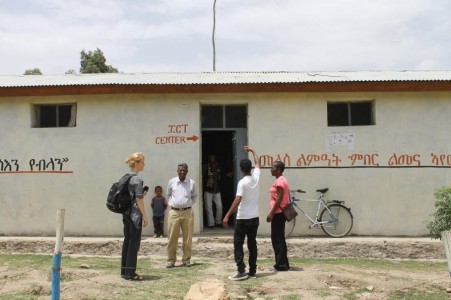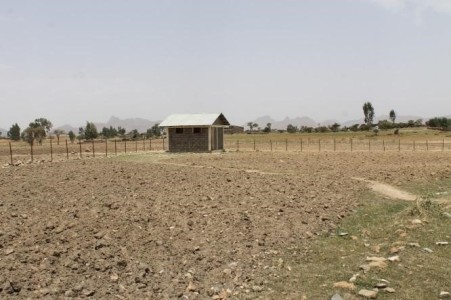Parents worldwide often bemoan the fact that their children aren’t willing to try new foods. Scores of specialty cookbooks have been written on how to hide veggies in child friendly foods like spaghetti or mashed potatoes. In Ethiopia, however, the International Potato Center (CIP) and Irish Aid are turning the tables and working through children as one strategy to get their parents to adopt OFSP as a staple food in the local diet.
One site of this revolution is on the Adebra School garden plots in the Tigray region of Ethiopia. As members of the science club work the land, cultivating kale, peppers, tomatoes, cabbages, potatoes, with an emphasis on the Vitamin-A rich orange fleshed sweetpotato (OFSP) they learn new feeding habits that fortify their bodies. Led by their social science teacher, Ato Hafte Kidano, the children are taught how to grow, prepare and consume OFSP, and the vital role that Vitamin A and micronutrients play in the health of mothers and young children. “If we eat [OFSP], we can protect against different diseases, gain better eyesight, and have vigilant minds,” Kidano teaches them. Lessons they take home and share with their parents.
Working the land, however, is not enough. Children need to learn to love the taste of a new food and begin asking for it at home. With that in mind as part of the World Food Program’s (WFP) school wide feeding program the garden’s OFSP harvest goes to provide up to two nutritious meals a week to the science club’s 800 fellow classmates. Their OFSP is cooked up as new versions of local favorites such as injera, a thin bread in disk form, served at most meals. Over time the children develop a taste for the sweet vitamin rich sweetpotato and begin asking for it at home.
“The secret is that children like it,” says Haile Tesfay a CIP/Irish Aid project coordinator in Tigray. “We provided a lot of OFSP training to adults but when it came to them taking the vine home to grow it, we weren’t successful. OFSP is very sweet and (adults) consider it a child’s food. Children don’t have defined feeding habits but adults are already set. Children can convince their father or mother because they want to make their children happy.”
CIP and Irish Aid Make School Feeding Program Sustainable
When the WFP started its feeding program in Adebra five years ago, the food provided was brought in from outside. While it was effective in helping boost the nutritional levels in children it was a temporary fix and not a long-term solution. In a region where five out of every ten children younger than the age of 5 are stunted and one in ten is severely underweight nutritional support is an imperative, but it is much more impactful when given in the form of meals that can be grown and prepared at home. CIP and Irish Aid saw potential and proposed starting school garden programs in four schools with an emphasis on OFSP and transformed the process of planting and caring for crops into life changing lessons.
Chronically food insecure Tigray faces multiple challenges for food production. Reliance on seasonal rains for irrigation coupled with poor soil fertility has resulted in diminishing harvests. Farming families generally can only feed themselves with the food they grow for up to six months of the year. For the remainder of the year, families rely on food assistance and working as day laborers while also resorting to coping strategies such as cutting back on meals. OFSP has been adapted to grow well in harsh conditions. It requires minimal input and produces harvests even in times of drought. Only a half a cup of OFSP roots is enough to provide enough beta carotene to provide the daily Vitamin A for a growing pre-schooler — a dietary coup in Sub-Saharan Africa where Vitamin A deficiency is the leading cause of blindness, disease, and premature death for pregnant women and children under 5.
of the year, families rely on food assistance and working as day laborers while also resorting to coping strategies such as cutting back on meals. OFSP has been adapted to grow well in harsh conditions. It requires minimal input and produces harvests even in times of drought. Only a half a cup of OFSP roots is enough to provide enough beta carotene to provide the daily Vitamin A for a growing pre-schooler — a dietary coup in Sub-Saharan Africa where Vitamin A deficiency is the leading cause of blindness, disease, and premature death for pregnant women and children under 5.
As the children grow accustomed to eating foods enhanced by OFSP they develop a taste for its sweetness. Taste tests conducted amongst the students pairing foods made with the more costly traditional flours brought in from the capital city of Addis Ababa with foods enriched with OFSP and found the majority of the students preferred the latter because of its color and flavor. “This also benefits local farmers because instead of factory products OFSP farmers can sell to the schools, so they have a market (for their roots),” says Tesfay.
Creating demand while building supply is a huge part of CIP’s strategic objective of making OFSP a go-to food for Ethiopians in Tigray. In addition to the school-feeding program, CIP and Irish Aid promote OFSP at pre-natal health check-ups, radio announcements, and working directly with farmers. “Adults, if you give them training and education might just plant a small number of vines,” says Tesfay. “Instead of a conventional dissemination system (for promoting OFSP), we are using women’s development and school programs to convince community members to take vines.” By targeting women who make the decisions of what I served at the family table and children who influence those decisions, the program can reach more households in a shorter period of time.
Growth of OFSP School Gardens Reaching New Schools

Working closely with teachers and school administrators the program is locally tailored to the unique culture and circumstances of every participating school. Teachers like Ato Hafte teach students not only how to care for their vines and how to make dishes using the roots and leaves. Their newly minted knowledge empowers children to help influence decisions at home. To help cement this message parents are invited to Parents Days’ where they can participate in cooking lessons, watch theater skits produced by their children on the benefits of OFSP and are invited to taste test OFSP dishes.
Students are also encouraged to take vines home and grow them in their family backyard. “We use the school as a bridge to show families how to care for OFSP,” says Tesfay. “They take the vines and pressure their family, their fathers, to grow it at home.”
What started as four pilot schools has now grown to 15. Adebra School has even become a decentralized vine multiplier making vines available for sale to other schools and members for the community. As kids’ demand for OFSP grows they help teach their parents to adopt it to their own diets making meals a vitamin-A packed infusion that benefits the entire family.
African Potato Association – Growing wealth and health for a diverse continent: In 2016 the 10th Triennial Conference of the African Potato Association (APA) will be held in Addis Ababa, Ethiopia and will be hosted by the Ethiopian Ministry of Agriculture (MoA), the Ethiopian Institute of Agricultural Research (EIAR) and the International Potato Center (CIP). The APA’s core objective is promote production and utilization of potato and sweetpotato for food and nutrition security in Africa and to facilitate knowledge sharing by bringing together diverse stakeholders in the potato sector across Africa. Drawing scientists, practitioners and entrepreneurs from over 20 African countries and abroad, the APA members cover an extensive range of research and development of the promising crops. If you are interested in finding out more about the APA or you are interesting in supporting or participating in the event please contact: info@apa2016.org
